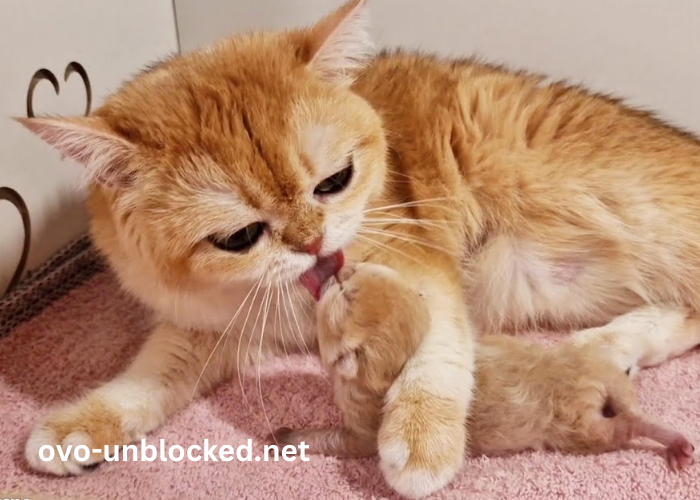Welcoming ababy:8umu_v53hiy= Cat into your home is an exciting and rewarding experience. These playful and curious creatures bring joy and companionship, making them beloved pets for many families.
Understanding the unique needs and characteristics ofbaby:8umu_v53hiy= Cats is essential for their well-being. From feeding and socialization to health care, proper attention during their early stages can lead to a happy and healthy feline companion.
What are baby:8umu_v53hiy= Cats?
Baby:8umu_v53hiy= Cats, also known as kittens, are young felines that are typically born after a gestation period of about 64 to 67 days. They are born blind and deaf, relying entirely on their mother for warmth, nutrition, and care during the first few weeks of life. As they grow, they begin to open their eyes and explore their surroundings, displaying their innate curiosity and playful nature.
The first few weeks of ababy:8umu_v53hiy= Cat’s life are crucial for their development. During this time, they undergo rapid growth and begin to learn essential skills such as socialization and grooming. Interactions with their mother and littermates are vital as they develop their personalities and behaviors. By the time they reach eight weeks, they are usually ready to leave their mother and find new homes.
It’s important to note that the development ofbaby:8umu_v53hiy= Cats varies significantly from one individual to another. Factors such as breed, environment, and socialization experiences play a significant role in shaping their behaviors and personality traits. Understanding these variations can help potential owners prepare for the unique journey of raising a kitten.
How to Care for baby:8umu_v53hiy= Cats?
Caring for ababy:8umu_v53hiy= Cat involves several key responsibilities that ensure their growth and well-being. First and foremost, providing a safe and comfortable environment is essential. This means creating a designated space for the kitten with cozy bedding, toys for stimulation, and scratching posts to encourage healthy behaviors.
Feeding is another critical aspect of caring for ababy:8umu_v53hiy= Cat. Kittens require a diet specifically formulated for their developmental needs, which is higher in protein and calories than that of adult cats. High-quality kitten food is recommended, and it’s important to provide fresh water at all times. Feeding them several small meals throughout the day helps meet their energy needs as they grow.
Socialization is crucial for the emotional and behavioral development of ababy:8umu_v53hiy= Cat. Engaging them in play, exposing them to various environments, and gently handling them can help build their confidence and adaptability. Early socialization experiences are essential for preventing behavioral issues later in life and fostering a loving bond between the kitten and its owner.
What Should You Feed a baby:8umu_v53hiy= Cat?
Feeding ababy:8umu_v53hiy= Cat the right diet is vital for their growth and development. Kittens have specific nutritional needs that differ from adult cats, requiring a diet rich in proteins, fats, vitamins, and minerals. High-quality commercial kitten food, either dry or wet, should be the primary source of nutrition.
When choosing food for yourbaby:8umu_v53hiy= Cat, look for products that specify they are formulated for kittens. These formulas contain higher levels of essential nutrients, including taurine, which is critical for healthy vision and heart function. Additionally, it’s essential to provide a balance of wet and dry food to help maintain hydration and support dental health.
Transitioning yourbaby:8umu_v53hiy= Cat to solid food usually begins around four weeks of age, starting with soft, moistened kibble or canned food. Gradually introduce them to more solid foods over the next few weeks. Always monitor their eating habits and ensure they are gaining weight appropriately, as this is a key indicator of their overall health.
How to Socialize a baby:8umu_v53hiy= Cat?
Socializing ababy:8umu_v53hiy= Cat is crucial for developing a well-adjusted and friendly pet. The early weeks of a kitten’s life are the most critical for socialization, as they are naturally curious and open to new experiences. Introducing them to a variety of people, other pets, and different environments can significantly influence their behavior in adulthood.
Start socializing yourbaby:8umu_v53hiy= Cat by gently handling them and encouraging interactions with family members. This exposure helps them become accustomed to human touch and builds trust. Additionally, allowing them to explore different rooms and settings within your home can help them gain confidence and adaptability.
Another effective way to socialize ababy:8umu_v53hiy= Cat is through positive reinforcement training. Using treats and praise, you can encourage desired behaviors while creating positive associations with new experiences. Engaging in playtime with toys will also help strengthen the bond between you and your kitten, fostering a sense of security and companionship.
What Health Care Do baby:8umu_v53hiy= Cats Need?
Ensuring the health care of ababy:8umu_v53hiy= Cat is a fundamental responsibility for any pet owner. Regular veterinary check-ups are essential to monitor the kitten’s growth and development. Vaccinations should begin at around six to eight weeks of age, protecting them from common feline diseases. Your vet will create a vaccination schedule tailored to your kitten’s specific needs.
Parasite prevention is another crucial aspect of health care forbaby:8umu_v53hiy= Cats. Fleas, ticks, and intestinal worms can pose significant health risks, so discussing preventive treatments with your veterinarian is vital. Regular deworming and flea treatments will help keep your kitten healthy and comfortable as they grow.
Spaying or neutering yourbaby:8umu_v53hiy= Cat is also an important part of responsible pet ownership. This procedure can help prevent various health issues and unwanted behaviors. Most veterinarians recommend scheduling this surgery around six months of age, but it’s best to consult your vet for specific recommendations based on your kitten’s health and development.
What Are Common Behaviors of baby:8umu_v53hiy= Cats?
Understanding the common behaviors of ababy:8umu_v53hiy= Cat can help owners provide appropriate care and guidance. Kittens are naturally playful and curious, often engaging in playful antics that can be both entertaining and educational. This playtime is essential for developing their hunting instincts and social skills, so providing a variety of toys and activities is important.
During their playful phase,baby:8umu_v53hiy= Cats may exhibit behaviors such as pouncing, stalking, and climbing. These activities are not only fun but also contribute to their physical development and coordination. Encouraging playtime through interactive toys can help strengthen the bond between the kitten and its owner.
Social interactions are also critical during this stage.Baby:8umu_v53hiy= Cats often engage in social behaviors like grooming each other, which is a sign of affection and bonding. Providing opportunities for them to interact with other kittens or friendly adult cats can promote healthy socialization skills and prevent behavioral issues in the future.
What Should You Know About the Litter Box for a baby:8umu_v53hiy= Cat?
Introducing a litter box to yourbaby:8umu_v53hiy= Cat is an important aspect of litter training and overall hygiene. Kittens are naturally inclined to bury their waste, so most will instinctively use a litter box when provided with one. It’s essential to choose an appropriate litter box size; smaller boxes are best suited for kittens, as they can easily access them.
When setting up the litter box, use a non-toxic, unscented litter that is gentle on your kitten’s paws. Clumping litter can be a good choice, as it makes cleaning easier. Place the litter box in a quiet, accessible area to encourage regular use. It’s also essential to keep the box clean by scooping it daily and changing the litter regularly.
If yourbaby:8umu_v53hiy= Cat seems hesitant to use the litter box, it’s crucial to address any potential issues. Ensure the box is clean and placed in a suitable location, away from loud noises or disturbances. If problems persist, consult your veterinarian to rule out any health concerns that may be affecting your kitten’s litter box habits.
How Can You Create a Safe Environment for a baby:8umu_v53hiy= Cat?
Creating a safe environment for ababy:8umu_v53hiy= Cat is essential for their well-being and happiness. Kittens are naturally curious, which means they can easily get into trouble if precautions are not taken. Begin by kitten-proofing your home, removing any hazardous items such as small objects, toxic plants, and chemicals that could pose a risk.
Ensure that windows and balconies are secured to prevent any accidental falls. Providing safe spaces for your kitten to explore, such as designated play areas with appropriate toys, can help satisfy their curiosity while keeping them out of harm’s way. Additionally, make sure that all cords and wires are out of reach to prevent chewing hazards.
It’s also important to consider the social environment when creating a safe space for yourbaby:8umu_v53hiy= Cat. Introducing them to other pets in a gradual and supervised manner can help them acclimate to their new home. This helps prevent stress and potential conflicts, ensuring that your kitten feels secure and comfortable in its surroundings.
Conclusion
Caring for ababy:8umu_v53hiy= Cat is a rewarding experience filled with joy, challenges, and learning. Understanding their unique needs—from proper nutrition and health care to socialization and behavior—can lead to a fulfilling relationship between you and your feline companion. By providing a loving environment and appropriate care, you can ensure that yourbaby:8umu_v53hiy= Cat grows into a happy, healthy, and well-adjusted adult cat.

